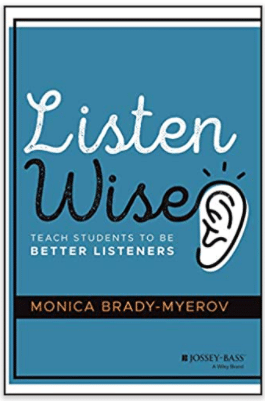Last Updated on September 21, 2022
Today’s blog post takes a deep dive into an upcoming chapter of my book: Listen Wise: Teach Students to be Better Listeners. You can explore a sneak peek on ch. 3 this is your brain on listening and ch. 4. on how to teach listening.
When I was a reporter, and my stories were heard nationally on NPR, I can’t tell you how many times adults told me something they learned by listening to public radio. Sometimes they would cite a fact from one of my stories and not realize it was my report. What people learned from listening would often come up in dinner party conversation. But I could see that my friends as well as strangers learn every day by listening to podcasts and public radio. And the importance and prevalence of listening has only grown in the past few years, as the dynamic of information sharing, especially in journalism, has shifted to more audio through podcasts.
In my forthcoming book “Listen Wise: Teach Students to be Better Listeners,” I begin by discussing the importance of viewing listening as a skill that can be taught. And YOU can do it!
At education conferences, I know an easy way to engage teachers walking by is to ask them if they think their students are good listeners. The overwhelming response:
“My students don’t listen!”
They tell me they must repeat themselves when explaining how the Civil War got started. Or demonstrate a math concept over and over. They give simple homework directions in multiple ways. They call out to students many times before they have their attention. They lament that their students are poor listeners.
Many teachers are at a loss for what to do about it. My book will help.
Why Listening Matters
There are some skills that will make you successful no matter who you are or what you’re doing. The ability to listen well is unequivocally one of them. In education, we are focusing more than ever on developing students’ 21st century skills such as critical thinking, problem solving, and communication. Listening is a key social skill, as well as a literacy skill, that needs attention. Listening is also an equalizing force that can broaden access to the curriculum.
Maybe you haven’t stopped to think about this essential skill. You haven’t wondered if you are a good or bad listener, but trust me, others have evaluated you. And your listening ability could be holding you back or helping you excel. Good listening skills help you learn to read, become a better learner, be more empathetic, and succeed at work and in personal relationships. Listening is foundational to learning. It’s the way we show others that we care. It’s how we absorb critical information at work. It’s the first and probably the last thing you will do in your life. Listen.
It is especially key to learning because effective listeners are better learners. As a teacher, you can play an important role in developing your students’ listening skills, no matter what subject you are teaching. If you want to prepare your students to succeed in future jobs and career, you should think about including listening instruction in your curriculum. And not just practicing listening skills, but also assessing them and tracking progress.
This book will give you practical examples of how to teach listening.
For a long time as a reporter, I knew I was a good listener. I had to be! Now, I find it deeply fulfilling to help educators teach this overlooked, yet vital skill.
Listen Wise: Teach Students to be Better Listeners will be published by Jossy Bass, a Wiley imprint in April. It will also be available as an ebook and audiobook.

